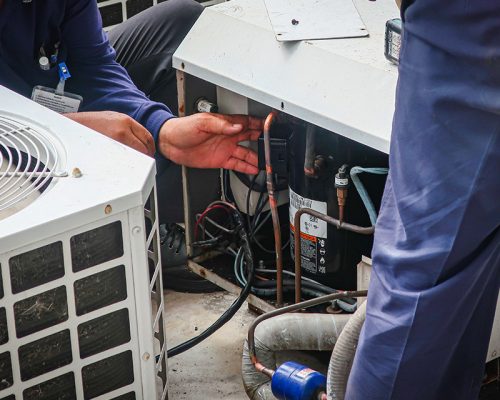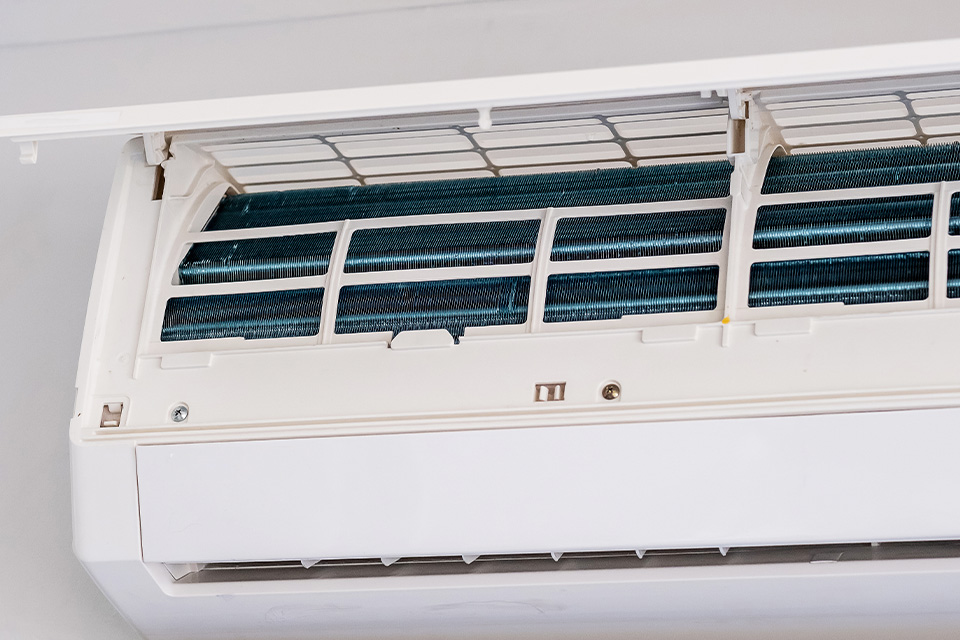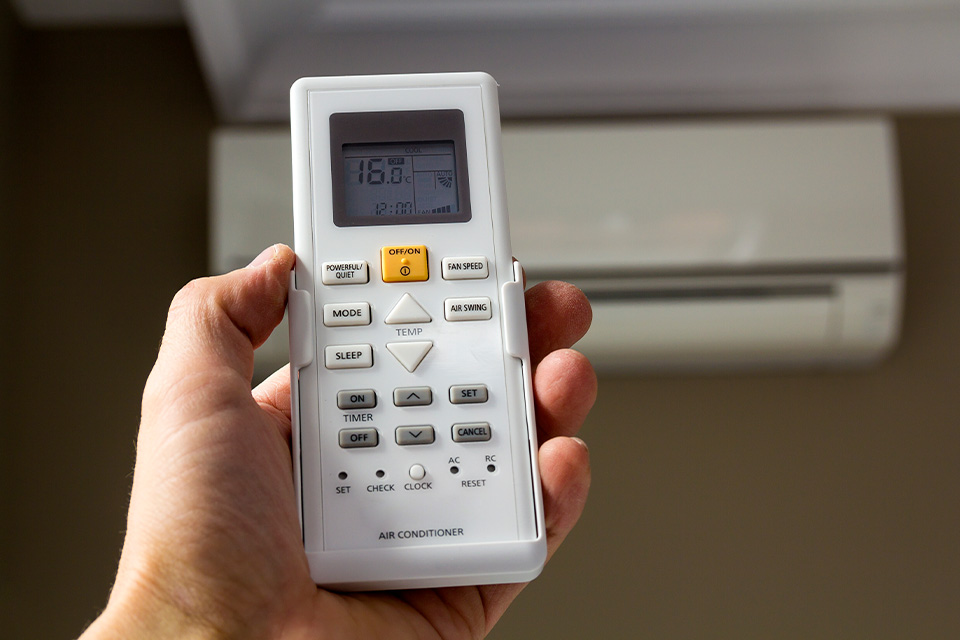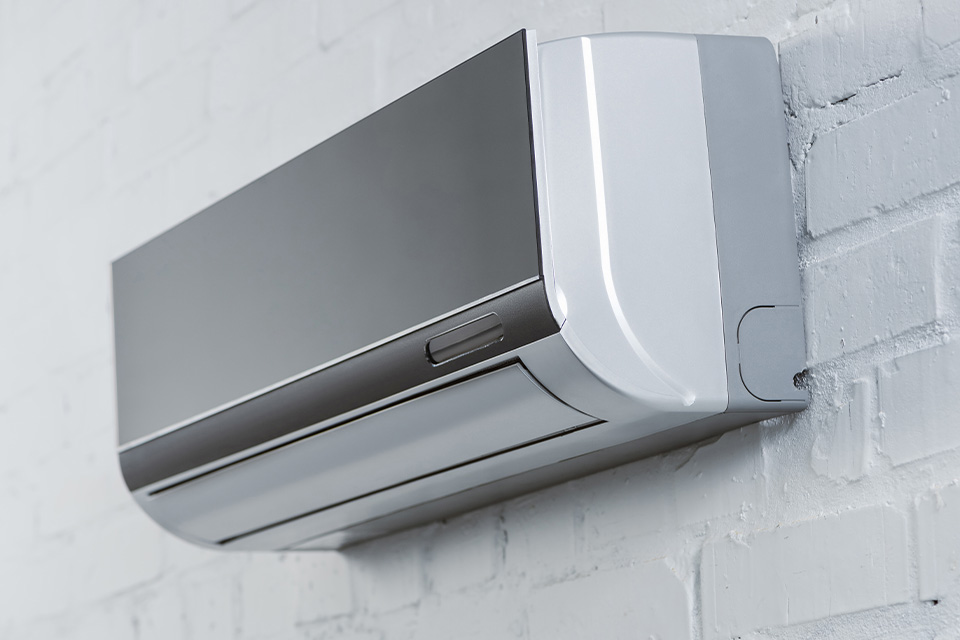
Quietest Air Conditioner
November 16, 2023
How Much Electricity Does a Heater Use?
June 4, 2024Air Conditioner Replacement Cost

As seasons change and temperature fluctuates, the reliability of your air conditioning unit becomes paramount. Whether it’s combating a scorching summer day or providing comfort on a chilly winter night, the cost of replacing your air conditioner can be daunting. If you’re dealing with an outdated unit or simply seeking greater energy efficiency, understanding the costs is crucial. Read on to discover when to consider when replacing an air conditioner and the costs to replacing and installing a new unit.
What To Consider When Replacing an Air Conditioner
When your air conditioner starts making strange noises or is less efficient, it can be hard to tell if it needs a service or is time for an upgrade. If you have only had it for a short time or have kept up to date with regular servicing and maintenance, you may want to keep it. Considering these factors will help you decide if it is time for a replacement
- Age. The lifespan of different air conditioners varies, but all air conditioner units have a “best before” date. This is why the age of your unit is an essential factor when deciding if it needs to be replaced. On average, an air conditioner will last up to 15 years. It is less for a window or portable unit at around 5-10 years and more for a central ducted air conditioning unit with a lifespan of 15-25 years, depending on how well it is maintained. If your air conditioner is very old, there is a good chance it will need to be replaced.
- Energy Efficiency. If your electricity bills have had a notable increase, it is possible your air conditioner is running less efficiently than it was. The air conditioner may appear to be running as expected and not making noise. However, if your bills have skyrocketed, it is a telltale sign that your air conditioner might be overcompensating and using more power to achieve the same cooling result. Before replacing your air conditioner, you may want to try cleaning out the vents or replacing the filters. However, if the unit is also an older model, it may be time for a new one.
- Ongoing costs and maintenance. If you regularly have to call the air conditioner repairer and costs are getting out of control, it is probably time to consider replacement. Air conditioners should only need a service once yearly unless reverse cycle and heating are used. When your air conditioner needs to be repaired or serviced more frequently, it is better value to replace it than to keep using the older unit.
- Unusual noises. All air conditioners make some sound, but some are quieter than others. If your air conditioner is suddenly making noises you haven’t heard on a regular basis, get it checked out by a professional but be aware it might need replacement.
- Unpleasant odours. Any unpleasant smell from your air conditioner is not normal and needs to be investigated immediately. Odours from air conditioning units can be as serious as burning coils, which are potential fire hazards, or mould particles in the unit, which are harmful for breathing.
- Upsizing or downsizing. If you have more people living in the home or you build an extension, you may want to replace your current unit with a larger air conditioner to accommodate the extra people or extra space. Alternatively, if you are downsizing and there are not as many people in the household, you may want to replace your large system with a smaller unit that will cost less to run.
- Upgrade. If you have decided you would like a better air conditioner, a more modern version, one that is more eco-friendly or has smart home applications, you would be replacing your old unit. Sometimes it is not necessity, but choice that leads to replacement.
- Possible rebates. By replacing an air conditioner with an energy efficient unit, you may be eligible for a government rebate, depending on the state.
- Non-repairable. If you have been determined not to replace your air conditioning unit, the fact it is non-repairable will be the final straw. If your air conditioner no longer blows cool air, makes loud noises, or smells awful and cannot be fixed, it is time for a new one.

Air Conditioner Replacement Costs
If you have decided it is time to replace your air conditioner, the cost will depend on two main factors – the unit cost and the installation cost. The unit’s cost depends on the type, brand, size, energy efficiency and smart features. The installation cost will depend on the size, complexity and if the unit is being replaced. A large home with a ducted air conditioning system replaced with a smart home system will be more expensive than a wall-mounted split system installed in a moderate-sized room. Here we examine the types of air conditioner systems and associated costs, the cost of installation, and the factors that affect them.
Split System Air Conditioner
- These are the most popular air conditioning systems installed in Australia. Two types of split system air conditioners are single and multi-head. A single-head system is a wall-mounted system that works in small and large rooms. The multi-head unit is also a wall-mounted system, but this has multiple indoor units linked to a single outside condensing unit.
- System Cost (approximately). The price of a split system will vary depending on the type, brand and size. The cost of a split system unit varies from $650 to $5,000. A small split (single) system may cost between $600 and $900, while a large split (multi) system for multiple rooms will average around $2500-$3000. You can purchase a split system independently and then organise installation or buy the unit and installation together.
- Installation cost. Installation of a split system air conditioner can cost anything from $600 to $1,500, depending on the installer’s hourly rate and the level of complexity.
- *Split system installation must be performed by a technician.
Ducted Reverse-Cycle Air Conditioner
- As the name suggests, ducted reverse-cycle air conditioning is achieved using ductwork piping throughout the house within the ceilings and under the floor. Modern ducted reverse-cycle air conditioners are zoned, which means you can control the temperature in each room.
- System Cost (approximately). The price of ducted reverse cycle air conditioning will depend on the number of zones in the home, the brand, and the installation difficulty. To buy a ducted unit upfront (minus installation), you will be looking at between $2,000 to $10,000, depending on the size and brand.
- Installation cost. Installing ducted reverse cycle air conditioners is more costly than a wall-mounted split system, as the building needs to be plumbed and wired with vents and the central unit installed. Depending on the hourly rate, complexity level and project size, installing ducted reverse-cycle air conditioners can cost between $5,000 and $12,000.
- *Ducted reverse cycle air conditioning must be installed by a technician.
Ducted Evaporative Cooling System.
- This energy-efficient, natural approach to air conditioning leverages the physics behind evaporation to remove heat from the air in your home. On average, it can reduce your home’s temperature by 10 degrees and is more affordable than ducted reverse-cycle air conditioning. Evaporative cooling draws hot air from outside over wet filter pads. As the air flows over the pads, the water evaporates, reducing the temperature in the room. The evaporative cooling unit is placed on the roof, and ceiling ducts distribute the cool air throughout the home.
- System Cost (approximately). To purchase a ducted evaporative cooling system, the upfront cost can be between $1500 to $3000, depending on the size and brand.
- Installation cost. As one of the most economical ducted systems on the market, it will cost between $700 and $5000 for installation, depending on the difficulty of the job.
- *Ducted evaporative cooling must be installed by a technician.
Wall-Mounted Air Conditioner.
- Known as ductless air conditioners, wall-mounted air conditioners are units mounted on the wall that cool a single space. The most popular types of these units are split systems or reverse cycles, and they are effective at cooling individual rooms. Many homes will have multiple wall-mounted air conditioners in living rooms and bedrooms. Both split system and reverse cycle wall-mounted air conditioners can be installed on external or internal walls. Reverse cycle will heat and cool, while the split system will only cool.
- System Cost (approximately). The upfront cost for a wall-mounted air conditioner can be as little as $800 up to $5500, depending on the brand, type and size.
- Installation cost. The average cost to install a wall-mounted air conditioner is between $800 to $1,000, as it is a simple installation into a wall. If you have multiple units installed, the cost will be multiplied by the number of installation points required.
- *While some people try to install their own wall-mounted air conditioners, it is recommended to hire a professional technician.
Portable air conditioner.
- As the name suggests, portable air conditioners are non-fixed units that can be moved from room to room. They are ideal for renters or as a back-up air conditioner as a mobile unit to cool any room.
- System Cost (approximately). Most portable air conditioners cost between $500 and $900, but units can be priced as high as $1800.
- Installation cost. A portable air conditioner does not require professional installation, so the upfront cost is your only initial outlay.

Factors Affecting Air Conditioner System Costs
Several factors will impact the cost of an air conditioning system, and it is up to you to decide which are the non-negotiables. You may have a large home to cool, but a bigger size and capacity will likely mean a higher price tag. Perhaps you want the smart home features or have your heart set on a particular brand. We outline the factors that can affect the price of an air conditioner system.
- Size and capacity. The size of the unit you choose matters. It is vital to choose the right size air conditioner for the area you wish to cool, even though a large unit will be a bigger outlay at the start. If you choose an air conditioner that is too large, you will have paid too much, and the unit will over-cool the area. If you select an air conditioner that is too small, it will work overtime, and energy bills will skyrocket.
- Brand. As a rule, higher-end air conditioner brands tend to have a higher price tag compared to their more budget-friendly counterparts. However, the higher-end brands tend to be more energy efficient, which will save money on energy bills. A cheaper brand may cost less initially but will be more expensive to run and have a shorter lifespan than more reputable brands.
- Smart features. Smart air conditioners are more expensive than regular air conditioners but can save you money in the long run with less power consumption. They have smart features that include remote monitoring from a smartphone, a Wi-Fi connection, and sensors. Advanced models can even send your energy usage to your phone, cool down a room before you arrive home, recognise someone entering the room and adjust the temperature accordingly.
- Time of year. Buying an air conditioner in the winter can help save you money as demand for air conditioners cools down. Often, this is when you will find sales and promotions to keep up with demand in the off-peak season. It is also a way for manufacturers to clear out last year’s models as they make way for the new ones. Similarly, you are likely to pay top dollar if you buy an air conditioner in the hot months with demand at a peak again and little need for reduced prices.
Factors Affecting Installation Costs
When getting quotes for your air conditioner installation, it is essential to understand that the amount of time the installation will take is a significant factor. The longer the installation, the more labour required. The length of time required for installation will be determined by several factors.
- Type & size of system. The type of system affects how much it will cost to install. A large ducted air conditioning system will take longer to install than a wall-mounted air conditioner, increasing the labour cost. A smaller system will take less time and cost less.
- Number of units. The more units you have to install, the more labour and materials will be needed, and costs will be driven up. For wall-mounted systems, this could be multiple units. For ducted systems, this could be multiple vents.
- Complexity of installation. A more complex installation will take more time and materials and cost more. Installing a wall-mounted air conditioner into an internal wall will be more expensive than installing the same air conditioner into an external wall.
- Existing plumbing and wiring. If you are replacing an air conditioner, whether a wall-mounted or ducted unit, existing plumbing or wiring can make the installation a smoother transition and thus cost less.

Replacing an air conditioner will be met with a variety of costs which include the price of the unit and the cost of installation. However, replacing a unit is often less expensive than installing a new one. With the cavity in the wall already there for a wall-mounted unit or the ducted system already piped through the home, replacement is a good option that will save you money in the end. In this article, we have explained the signs it might be time for a new air conditioner and the costs involved to help you work out the best air conditioner for your home.
 Schedule a quote
Request a callback
Schedule a quote
Request a callback

Call us Mon-Fri: 8:30am-5pm or leave us a message for a callback.
